Menschel Senior Leadership Fellowship
The Menschel Senior Leadership Fellowship brings individuals who have recently served in high-level jobs in government, multilateral institutions, nonprofits, or business to the Harvard Chan School campus to teach and mentor students for an eight-week semester and partake in academic life at Harvard.
Apply To Be a Liaison
Student liasons
Harvard Chan students may apply to serve as student liaisons for Menschel Senior Leadership Fellows. Liaisons work on a volunteer basis to help integrate Fellows into the fabric of the Harvard community by introducing them to the community’s people, culture, and events.
About
Menschel Senior Leadership Fellows are in residence on campus for approximately 9 weeks; and in cases of short-term fellows, only 1-2 weeks. Given the abundance of resources at Harvard, they can hardly expect to see and do it all. However, student liaisons can greatly enrich a Menschel Fellow’s experience by sharing with them their own network and knowledge., including theiir connections to student groups, events, faculty, and other campus going-ons.
Seeing Harvard through a student’s perspective provides each Menschel Senior Leadership Fellow with a fuller sample of the Harvard community. In return, Student Liaisons build unique relationships with esteemed global leaders of public heath decision-making.
Our Fellows for Fall 2 term are Kate Walsh, Secretary of Health and Human Services for the Commonwealth of Massachusetts and Rosine Coulibaly, Minister of Economy and Finance of Burkina Faso and later as Minister of Foreign Affairs. They both will serve a Senior Leadership Fellows at Harvard Chan from October 27 – December 19, 2025.
Application Process
- The application and selection process for Student Liaisons generally takes place weeks prior to the arrival of a Senior Leadership Fellow. Note: The process may be delayed for positions pertaining to Fellows in the Fall 1 term, since a Fellow for that term will arrive prior to most students returning to campus.
- A separate application process for Student Liaisons will be held for each incoming Senior Leadership Fellow.
- Open positions and links to online applications will be posted on this page.
- Program staff will review all applications, meet with select candidates, and notify those chosen for positions.
Role
- Contribute ideas of activities, meetings, and events that may be of interest to the Senior Leadership Fellow.
- Meet regularly with the rest of the Student Liaison team and the Senior Leadership Fellow.
- Meet as needed with the Senior Leadership Fellows Program (SLFP) staff for support and collaboration.
Student testimonials
Being a part of the student liaison program really complimented my first semester at Harvard Chan. Through the program, I was able to connect with Mayor Kim Janey and learn more about the amazing work she’s done for the city and as a leader in health equity. It felt like a truly integrated experience, doing my public health coursework as well as being her student liaison, and I am grateful to have had this opportunity here at Harvard.
Yvette Cho, MPH ’22, student liaison for Kim Janey, Menschel Fellow ’23
Serving as a student liaison to Mayor de Blasio was a phenomenal experience. I deeply enjoyed co-facilitating small group dialogues on topics like poetry and public opinion, allowing Harvard Chan students, myself included, to learn creatively in conversation with the mayor. The student liaison program is a rare opportunity to engage with people who have served in high-level positions and gain unusual insights into what leadership may require.
Amal Cheema, MPH ’23, student liaison for Bill de Blasio, Menschel Fellow ’23
Executive Education for Sustainability Leadership
Learn powerful new strategies for making sustainability a driver of organizational engagement, innovation, and change.
Department of Environmental Health, Harvard T.H. Chan School of Public Health
Mandate Capital—Blend It Before You Spend It!
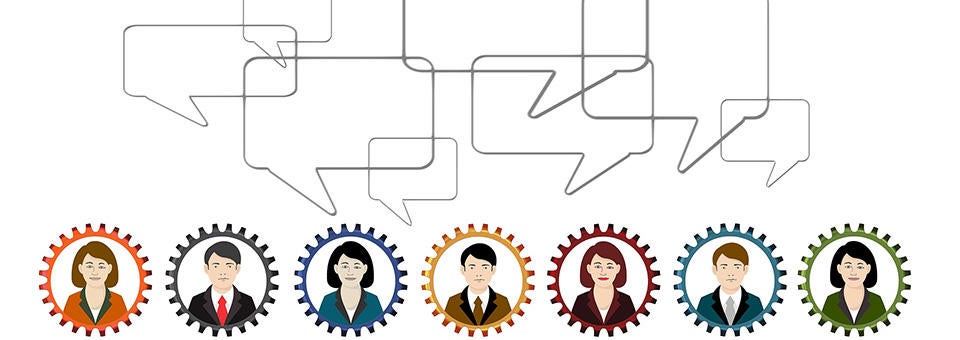
Leith Sharp, Director of our Executive Education for Sustainability Leadership program, contributed as a guest blogger for the Walk of Life Careers website.
It’s helpful to think of mandate as a kind of capital. We use it in our organizations to get things done. Mandate uses the power of directives to push down the chain of command to execute out on what needs to be done. The official story goes something like – if you can get the mandate – you can get it done. The actual story however is much more nuanced.
Our work has unearthed a powerful relationship between the use of mandate capital and the impact on the social health of our organizations, which we will call our social capital. We think of social capital as the health of the relationships between people, the levels of engagement, psychological safety, trust and shared purpose.
Date:
September 12, 2017
Credit:
Walk of Life Careers
Author:
Leith Sharp
Photo by Pixabay | geralt | Public Domain
Executive Education for Sustainability Leadership
Learn powerful new strategies for making sustainability a driver of organizational engagement, innovation, and change.
Department of Environmental Health, Harvard T.H. Chan School of Public Health
Put simply, we are in the wrong organizational vehicle for the 21st century
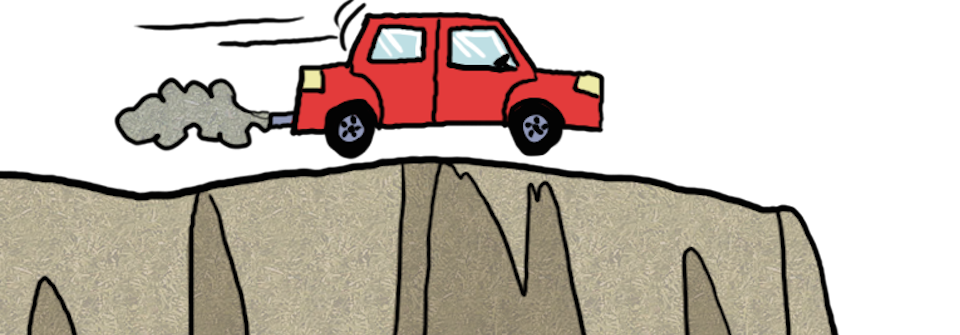
By Leith Sharp, Director of Executive Education for Sustainability Leadership, Center for Health and the Global Environment
I’ve been asking senior leaders this question: “Is there a clear path for a good idea to come from anywhere in your organization?” The general consensus is no, there is no clear path for a good idea to find its way forward from anywhere, not for universities, corporations, airports, government agencies, nor non-profits alike. There are some specific exceptions, but they are specific and they are exceptions. Instead the general agreement seems to be that the success of a good idea depends mostly on the sheer tenacity of its champion.
I’ve also been asking senior leaders, “Do you think management-driven hierarchy, or the command control operating system that predominates almost all sectors, is adequate for tackling a complex adaptive challenge like sustainability? Or is it adequate for tackling our other complex 21st century challenges?” No one is saying yes. Add to this anecdotal avalanche the empirical nugget that 70% of the US workforce is disengaged at work (Gallup State of the American Workplace Report 2013), and there you have it.
Nobody actually seems to think that our predominant mode of organizing is going to get us through this century effectively. Put simply, we are in the wrong organizational vehicle for the 21st century.
This is big news. It begs the question for the sustainability-minded, why are we all still running around the deck of this sinking ship, tossing out water and trying to change direction, when the ship itself might be our most immediate problem? One of the biggest reasons, of course, is that if we are going to talk about the deep work of organizational transformation, then we must have the involvement of enough senior leaders. Otherwise, it’s great dinner conversation, but there is no sleeve rolling come Monday. Senior leadership engagement around sustainability has been hard to stir up in any consistent way and the bandwidth senior leaders have dedicated to it has often been consumed by low impact leadership.
Senior Leadership Bandwidth Must Be Directed Towards High Impact Sustainability Leadership
To use Ron Heifetz’s highly effective dance floor and balcony metaphor for adaptive leadership, it seems that sustainability has been so new that we’ve collectively stayed on the dance floor, in the midst of the action. We haven’t found the sustainability balcony to perceive the bigger picture and the patterns. One result of this is that senior leaders have been peppered with individual sustainability battles, little victories and incremental goals towards doing less bad. As a result, many leaders have sensed in sustainability a bottomless pit of need that fills them with dread.
But that dread goes away as senior leaders find their way up onto the balcony to check out the dance floor action from above. From here they can see a way to lead within the constraints of their own bandwidth that will have lasting and expansive impact. There is a sense of liberation and possibility.
From this higher-level vantage point, it becomes possible to see how the right kind of sustainability leadership can transform an organization into an agile, innovative, and profoundly change-capable enterprise with the fitness to go beyond simply doing less bad towards a mutually regenerative relationship with our planetary life support systems.
Along with this new fitness comes the enormous value proposition of making other complex adaptive problems easier to solve as well. After all, sustainability is the ultimate complex adaptive problem, so developing the right organizational fitness to truly take on the sustainability triathlon (social, economic and environmental) pretty much guarantees relevant fitness for all of our other adaptive problems. Viewed and lead from the right elevation, sustainability is the problem that can solve your organization.
It’s Not About Throwing Out Command Control, It’s About Complementing It
To be clear, the sustainability balcony does not confer a spontaneous altered state of consciousness upon those that stand on it. Senior leaders remain understandably hesitant to explore uprooting the command control systems and structures on which their organization relies. But a significant number of leaders will entertain the idea of creating a second complementary operating system, an adaptive operating system, that can be harmonized with command control to bring about a new era of organizational engagement, agility and change-capability so that large numbers of good ideas can come from anywhere and take root, continuously and stably.
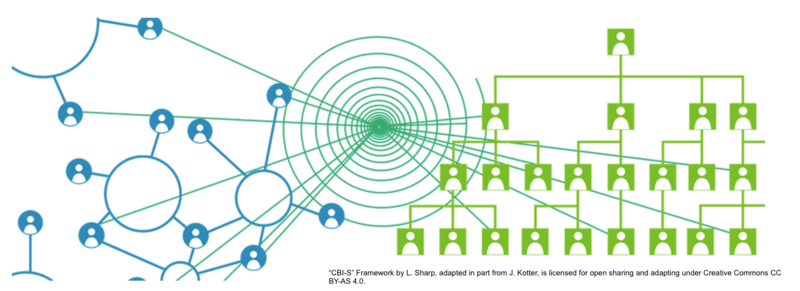
Defining Core Business Innovation for Sustainability (CBI-S)
The commitment to go beyond treating sustainability as an add-on and settling for doing less bad. It’s about taking up the qualitatively different leadership challenge of driving sustainability into the core mission and business of the organization by unleashing the profound motivational force that is sustainability and ensuring there are productive ongoing pathways for its full ongoing expression. A high-impact sustinability leader positions sustainability as a driver of organizational transformation to advance engagement, agility, systems-thinking, change-capability and innovation. The organization integrates and harmonizes adaptive cycles of engagement, collaboration and applied learning with command and control routines of scaling, execution and accountability. In summary, these frameworks transform or re-invent organizations to unleash the full potential of people to address complex adaptive problems.
Six Common Reactions to these Big Ideas
In the last 9 months we’ve shared these big ideas with over 500 senior leaders and sustainability professionals from different sectors at a variety of different conferences and workshops. Here is a short list of commonly observed reactions:
- Most leaders are relieved that instead of proposing the end of command control we are proposing the integration of the two operating systems.
- There is a widely shared intuitive understanding of the adaptive operating system (left in diagram), its potential & importance.
- Leaders who have been leading in this direction have been going it alone, intuitively & without a shared language or shared understanding.
- There is enthusiasm for using the language, graphics & framework to help make organizational transformation more of a team sport.
- Leaders are quick to identify the larger value proposition as being agnostic and applicable to other complex adaptive problems.
- Leaders affirm this framework will be best learned through applied exploration, ideally in the company of other senior leaders on the same path. To this end, there is agreement that sustainability is a very fertile laboratory for this applied organizational transformation process.
Aspects of This Are Not New in the Sustainability Space
Sustainability professionals exposed to this conversation are noting that the most successful sustainability efforts within large organizations have exhibited a recurring theme of the emergence of the adaptive operating system along with a Shakespearean-like struggle to integrate it with the existing command control operating system. The Shakespearean dimensions are generally shared over about the third drink as such riveting tales of heroism, tragedy and farce that one wonders why a sitcom hasn’t come out of it yet.
Sustainability professionals have also noted that their struggles have been greatly compounded by being without a shared language or shared understanding around the work of transforming organizational systems, processes and structures. They also agree that having this will be a game changer, effectively enabling change leadership for sustainability to advance from amateur sport to professional sport.
We Need An Army of High Impact Sustainability Leaders
We need large numbers of senior leaders and sustainability professionals from all sectors to become high impact sustainability leaders engaged in applied CBI-S experimentation and shared learning.
One powerful on ramp for anyone ready to engage in this critical leadership work can be found in the form of Harvard’s selective 4-day Executive Education for Sustainability Leadership programs. This program is designed for senior leaders and sustainability professionals from all sectors and is delivered by Harvard’s Center for Climate, Health and the Global Environment at the Harvard T.H. Chan School of Public Health.
We hope you can make it to Harvard but if not, stay tuned as the network of leaders, conveners and offerings grows. Stay connected by signing up for our mailing list.
Leith Sharp is the lead faculty and program director of Executive Education for Sustainability Leadership at The Center for Climate, Health and the Global Environment at the Harvard T.H. Chan School of Public Health.
Date Created:
April 2, 2015
Executive Education for Sustainability Leadership
Learn powerful new strategies for making sustainability a driver of organizational engagement, innovation, and change.
Department of Environmental Health, Harvard T.H. Chan School of Public Health
High-impact Sustainability Leadership
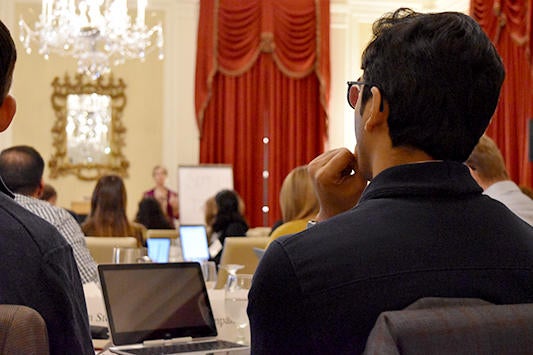
Our course shared the knowledge and tools sustainability leaders need to drive down negative environmental and human health impacts across all sectors.
In our rapidly changing world, ensuring that our planet will continue to sustain our children and future generations is an all-hands-on-deck endeavor. The impacts of climate change are already upon us, and the gap between rich and poor is such that the richest eight people in the world now own the same wealth as the poorest 3.6 billion, according to a recent report from Oxfam.
With these two dimensions in mind, Leith Sharp, Director of the Executive Education for Sustainability Leadership (EESL) program at the Center for Health and the Global Environment, convened her fifth intensive EESL course in mid-November. Over 70 sustainability leaders from the business, education, non-profit, and public sectors arrived on Harvard’s campus to confront the challenge of making their organizations and communities sustainable for the long term. They left with tools that foster the rapid innovation essential to implementing change at the pace, scale, and depth needed to make a difference for current and future generations.
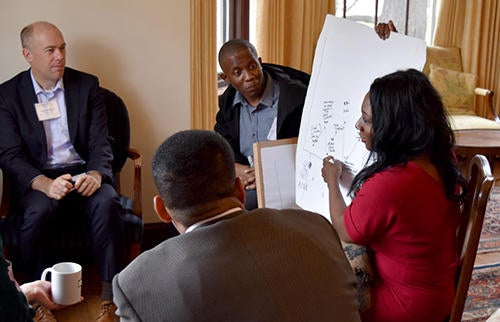
“This is our evolutionary test; we literally stand at a fork in the road,” Sharp said during her opening remarks. “We were born into the century where humans will either evolve back into alignment with nature, or our planetary life support systems will evolve in response to our impacts, and then we’ll be playing a very dangerous game of catch up.”
Organizational Design as a Human Health Intervention
Sharp maintains that this crossroads requires us to forge a different kind of relationship with our planet, and to do it in a way that is equitable. If this sounds like a heavy lift, Sharp believes it is far from insurmountable. She holds faith that we can do it by streamlining how organizations foster innovative sustainability ideas from inception to implementation.
“Humankind is absurdly creative,” Sharp said. “Think of the ways in which we can move information and energy through social agreements, and how we can work on ideas that span over centuries and continents, at every scale from the subatomic to the cosmic. How we set up our organizations greatly impacts how we tap our vast powers of human creativity.”
That is why Sharp designed the EESL program as a 5-day intensive course that examines how we can transform organizational structures to address our most threatening environmental and global health challenges.
Sustainability as the Driver of Worker Engagement
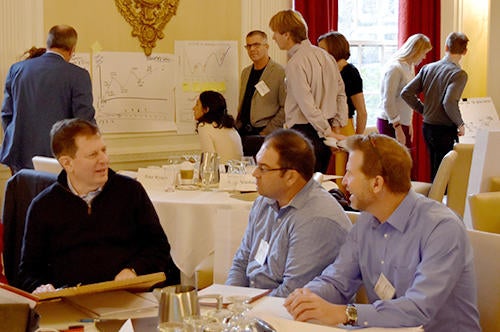
Gallup’s 2017 State of the American Workplace poll revealed that 67% of American workers are either not engaged at work, or are fully disengaged.
The EESL program teaches leaders to position sustainability as the driver of organizational engagement, innovation, and change. By creating effective processes for all employees to join in the protection of human and environmental health, leaders can rally workers from every corner to generate new ideas that can create significant positive impact.
To do this, we must radically increase the volume of innovative ideas conducive to improving life on our planet.
How much faster do we need to increase the pace? Sharp took a real-time poll of EESL’s 2017 cohort. Seventy-five percent said we need to at least quadruple our rate of innovation and implementation.
But how do we do it? To EESL attendees, this is where the magic begins.
Transforming Organizations by Charting ‘Idea Flow’
Sharp helps senior leaders achieve a radical increase in purpose-driven ideas by paying attention to the way ideas wend their way through an organization or community.
She has mapped the journey of over 1000 ideas by asking people to visually chart every move they made to take that idea from inception toward implementation. Sharp has unearthed patterns in journeys that experienced friction—when several attempts resulted in wasted time and effort—versus life cycles that experienced idea flow—when every move elevated the idea toward full implementation.
Sharp uses the idea-flow mapping process to determine which moves were dependent upon the more traditional and hierarchical command–control operating system (CCOS) of the organization, and which moves were dependent upon what she calls an adaptive operating system (AOS),an agile network-based system that stimulates shared purpose and non-hierarchical relationships.

Sharp trains leaders how to implement idea flow within their organizations and communities by tapping into the synergy between both operating systems.
From Theory to Practice
At the heart of Sharp’s EESL program is a commitment to activating high-impact, applied leadership that improves human health and the global environment.
Zeyneb Magavi, a leader at Mothers Out Front—a grassroots organization working to ensure a liveable climate—attended one of Sharp’s sustainability leadership courses in 2016 and returned this year to share her success story.
Prior to the course, Mothers Out Front had tried for years to sound the alarm about roughly 16,000 natural gas leaks across Massachusetts. While these leaks don’t pose a safety risk, they do emit methane, which is a more potent heat-trapping gas than carbon dioxide. Magavi credits the class for preparing her to navigate a complex collaboration between Mothers Out Front, regulatory agencies, and utility companies to measure, rank, and repair methane gas leaks throughout the state.
“Working with Leith and engaging in the EESL curriculum gave my collaborators and I the tactics, framework, and confidence to engage enormously diverse individuals and organizations in solving a complex shared problem,” said Magavi. “For decades we’ve had this problem in our midst. Why did we succeed now? Because we had the right people, tools, and the right leadership approach. This enabled us to engage the entire stakeholder ecosystem in getting to work. This is powerful, it is replicable, and we are going to use it again and again to take on these large-scale, complex human health and climate challenges.”
The impact of this work has set the stage for a reduction of 5% of greenhouse gas emissions in Massachusetts within two years.
Next year’s EESL offering will take place on Harvard’s campus November 5-9, 2018. Learn more here.
—By Marcy Franck, Communications Director, November 30, 2017
Photos by Skye Flanigan and Nicole Bellisle
Executive Education for Sustainability Leadership
Learn powerful new strategies for making sustainability a driver of organizational engagement, innovation, and change.
Department of Environmental Health, Harvard T.H. Chan School of Public Health
Idea Flow Mapping
We teach Idea Flow Mapping to map the journey of a new idea, from inception to implementation, including how it was impacted by its organizational and social context. The process enables leaders to better diagnose and reduce friction and optimize the healthy flow of new ideas from anywhere in the organization. Idea Flow Mapping helps with designing pathways for new ideas to go through healthy processes of de-risking, socializing, and scaling. This can lead to profound improvements in organizational design.
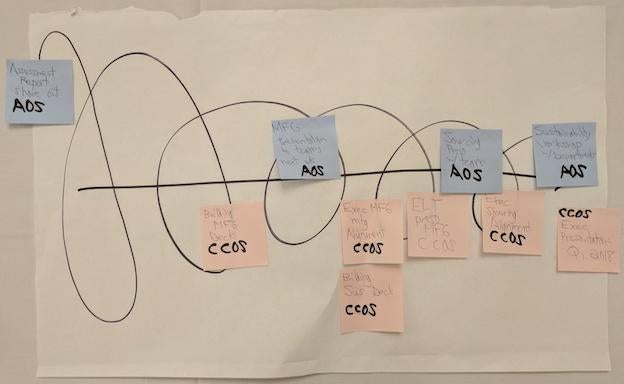
The essential demand placed upon humankind by myriad global environmental, social and economic imperatives is the demand to change almost everything we do, quickly, stably and constantly. This epic amount of stable change can only be achieved by the ongoing application, scaling and adaptation of enormous numbers of new ideas. Ideas of all scales, ideas that involve all disciplines, ideas that emerge within and across all types of organizations.
Ideas in themselves are mere vapours of possibility. Like seeds thrown to the wind, ideas follow the contours of a destiny shaped by a complex mix of conditions and forces. It is through the application, scaling and adaptation of ideas (or new knowledge) that real value and impact is generated. To this end, it is helpful to talk about Idea Flow.
Idea Flow considers the full life cycle of an idea from its inception to its robust implementation and continuous adaptation. Idea Flow concerns both the nature and quality of the path or process experienced by a new idea going through its full life cycle within its organizational/social context.
The Secret Life of Ideas
Every new idea, project or enterprise has a life cycle from inception to completion that is as unique as a fingerprint. This is because every idea exists within a unique context, faces a unique constellation of risks and opportunities and requires the engagement of a unique constellation of stakeholders to engage. As the idea progresses through its life cycle it passes through different stages. Each stage results in either the end of the idea life cycle or its progression onto the next stage. Early idea life cycle stages include things like sensing emerging need/possibility, idea inception, activation of champions or early adopters, etc. Middle stages of an idea life cycle often involve deeper learning efforts, piloting, iterating, de-risking and clarifying implementation requirements. Later idea life cycle stages include things like official approvals, funding allocations and scaling. By becoming explicitly and consciously engaged in understanding and designing the life cycle of an idea, friction can be reduced and Idea Flow increased. This allows people to bring more purpose-drive ideas to life with reduced levels of effort and social friction and increased levels of engagement and empowerment.
Idea Flow as a Human Health Intervention
The 21st Century has revealed a catastrophic gap in our societal capacity for addressing the later stages of Idea Flow, the stages of application, scaling and ongoing adaptation. One cataclysmic exemplar of this societal imbalance between knowledge creation and knowledge application – we know a lot about the sustainability imperative, its human health impacts and what we must do to secure the health and wellbeing of current and future generations, but we have applied, scaled and adapted very little of what we know.
What our Sustainability Leadership Program has been teaching us about Idea Flow
The problem we face right now is that our organizations are not designed to handle the emergence of large numbers of new ideas. They are not able to create Idea Flow. To understand more about this, we’ve been asking senior leaders this question: “Is there a clear path for a good idea to come from anywhere in your organization?” The general consensus is no, there is no clear path for a good idea to find its way forward from anywhere, not for universities, corporations, airports, government agencies, nor non-profits alike. There are some specific exceptions, but they are specific and they are exceptions. Instead, the general agreement seems to be that the success of a new idea depends mostly on the sheer tenacity of its champion. What’s more, leaders tend to concur that this level of dependence on tenacious champions is far from ideal.
If you’ve ever been one of those tenacious champions of a new idea – you know first hand, the exhaustion that results from navigating an organizational context that seems, at times, to go out of its way to inhibit anything new. Whether you are leading from the top, middle or grass roots – the work of championing a new idea through your organization is typically exhausting and fraught with discouragement.
Currently, most of our organizations, across all sectors, are designed primarily to ensure the efficiency and accountability over existing operations. They do not provide conditions for high volumes of Idea Flow. In essence, our dominant organizational model lacks a kind of fertility that is proving to be central to our future survival.
Idea Flow is something that can be learned, led and hardwired into our organizational DNA. The process begins with gaining an understanding the current state of Idea Flow within your organization. For this purpose, we have created an open source process we call Idea Flow Mapping.

The Official Story and the Real Story
See if this trend sounds familiar: Often in retrospect, when we try to explain how an idea came to fruition in an organizational context, we tell the story as a simple linear narrative, glazing over the complexities and the arduous dips and curves, the 3 steps back to our 2 steps forward, that were endured as we or others pushed for the idea’s implementation. We may not even be conscious about our tendency to literally iron out all of these zig-zags and curly-cues when we think back on the idea’s path on the individual level, perhaps because it was so exhausting to endure the first time we are not so ready to commit those parts of the tale to memory. The devil is in the details, as they say, and why would we want to relive the seeming tedium of this effort! Or maybe it is because the operating systems within which we conduct our business demand of us a linear, rational-seeming narrative. But, if we can make it a conscious practice to recall and document the REAL STORY rather than the OFFICIAL STORY, mapping the true complexity, we find that there is real value in seeing the path for what it truly was. By mapping the real story of what contributed to an idea’s successful implementation, patterns come into view that can become invaluable roadmaps for improving future Idea Flow.
We ask leaders and champions for important new ideas and innovations to step back, see the bigger picture, and unravel the workings and pathways within your organization, to better understand how decisions actually get made (rather than how we are told or assume they get made) and use this new understanding to bolster the efforts of those trying to push ideas of sustainability and innovation in our workplace. If we can see more clearly the rationale of decision-making and Idea Flow logic within our organizations, we can use this to foster the conditions for important ideas to successfully take root and blossom. This is key to the success of sustainability initiatives in particular, which may come up against old (outdated) organizational (ir)rationalities which believe sustainable practices to be antithetical to or outside the realm of the mission and vision of the organization.
How Do We Teach Idea Flow Mapping?
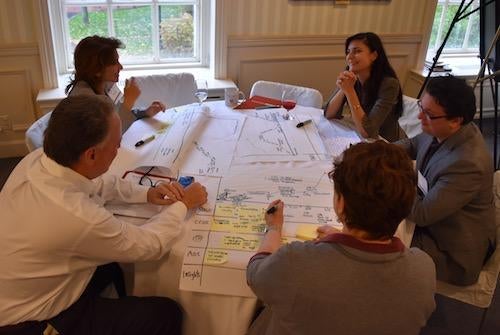
During our executive education sessions, we don’t just prescribe a remedy for your organizational woes that may or may not work when you get back to the office on Monday, where you may find it has no actual meaning or relevance for you in your work setting. We want you to use these 4 days to help co-create and (re)discover what we have already found to be an effective game changer for sustainability leadership, this concept of Idea Flow Mapping. We offer our cohorts the opportunity to run a diagnostic on their own past examples of an idea’s passage through an organization using our mapping template – to better understand how ideas have come to fruition in their respective sectors and organizations – and as a group attempt to tease out the trends and find the commonalities on how a good idea takes hold. And by conducting “forensics” on past successful idea flows, we are better equipped to understand and support the process of idea flow for future ideas, and to create the structures and conditions for the idea to come out on top and be enacted. In doing so, we are minimizing the “friction”, and enhancing the possibility of “flow”.
It is our hope that by cultivating these skills during our 4-day Exec Ed course, working with your peers from across a variety of sectors, you will walk away with a new understanding for how to effectively promote Idea Flow within your organization or network and be an effective sustainability leader adept at orchestrating and cultivating the conditions for meaningful shifts to occur.
The JPB Environmental Health Fellowship Program
A new generation of compassionate research scholars committed to solving complex environmental health challenges from multiple perspectives
Department of Environmental Health
401 Park Drive, 4th Floor WEST, 404N
Boston, MA 02215
Impact
Over the years, we’ve had the privilege of seeing our Fellows grow from junior scholars to leaders in their schools, agencies, and communities. Looking ahead, we’re confident our Fellows will continue advancing fairness, equity, and justice—strengthening the program’s legacy with innovative solutions for health equity and environmental justice. Thank you to all our supporters, partners, and community members for your commitment. Together, we’ve helped shape a new generation of environmental health scholars.
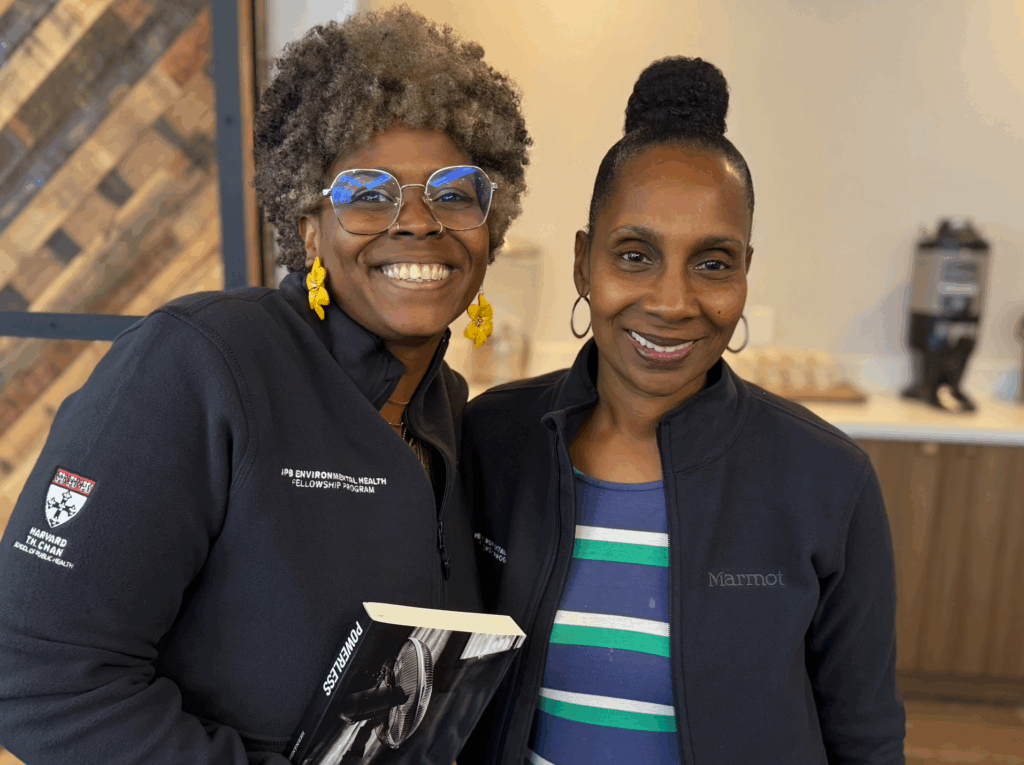
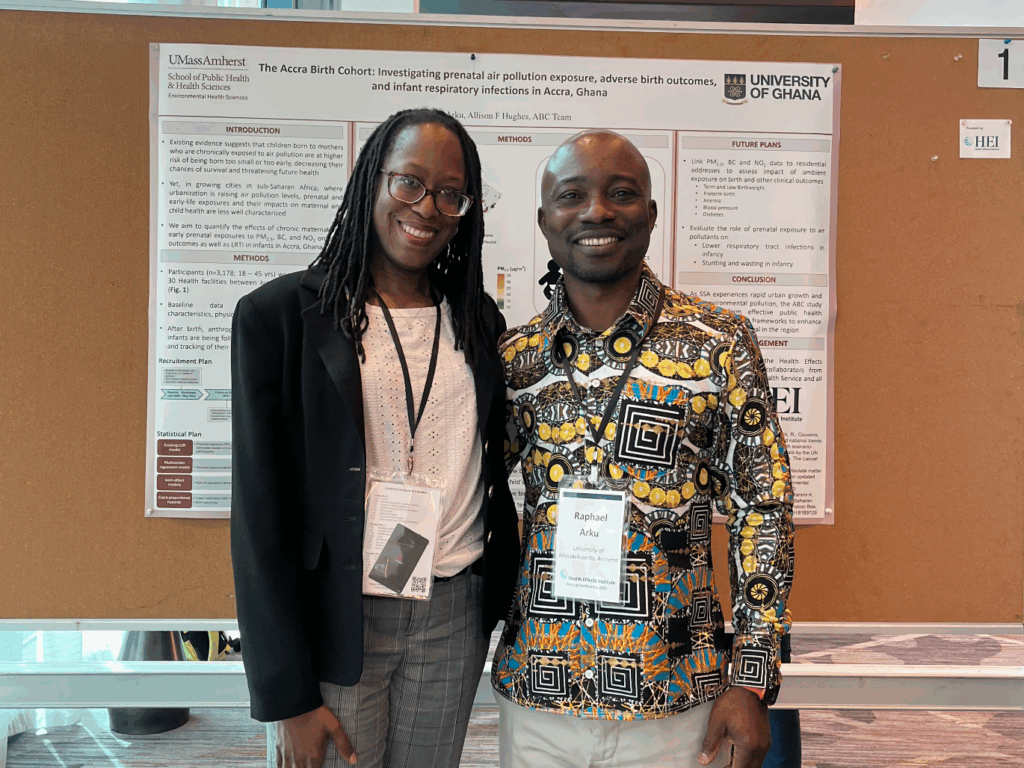
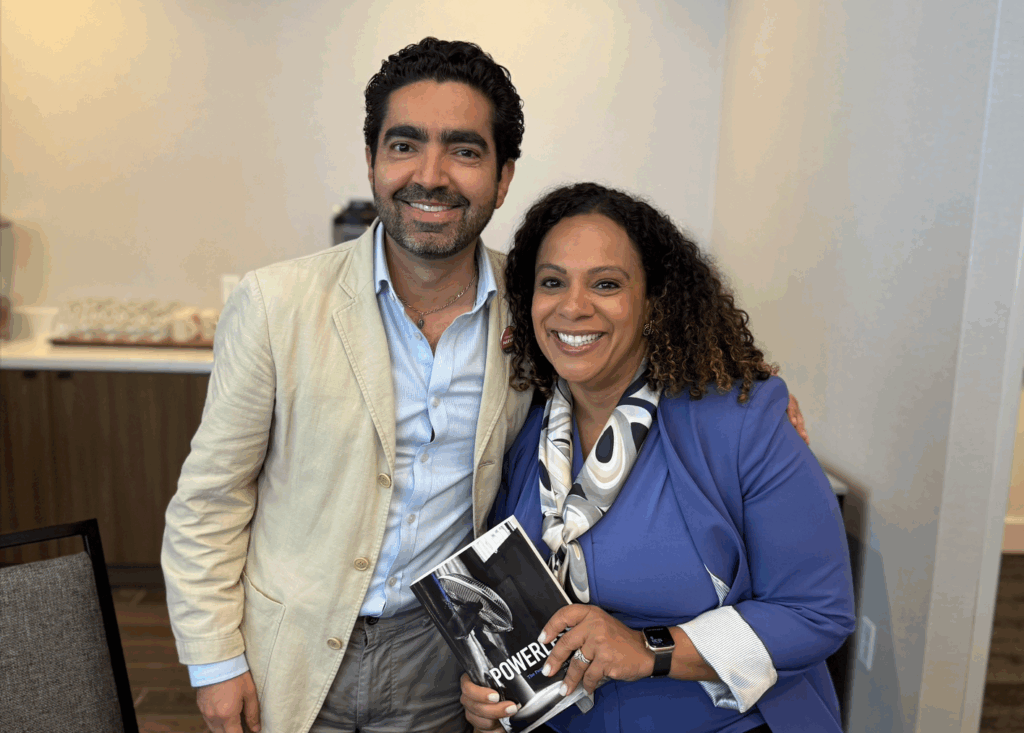
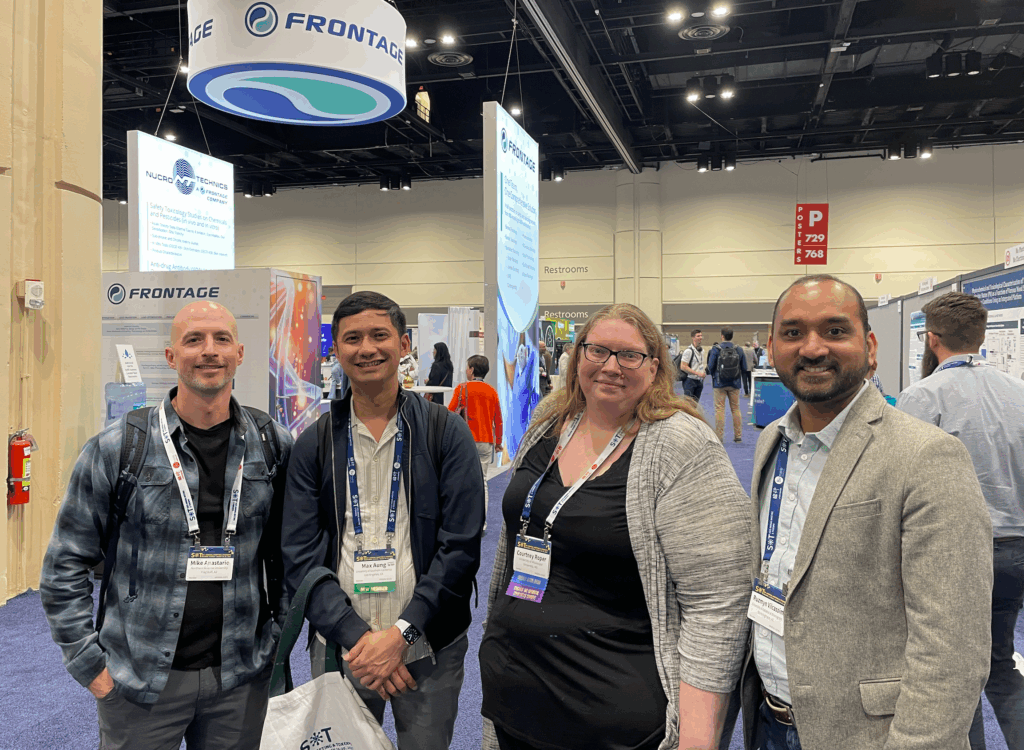
Highlights
44
The program has supported three cohorts—35 Academic Fellows and 9 Federal Agency Fellows—with 17 promoted to Associate Professor and two to Full Professor.
29
29 workshops and 18 environmental justice site visits have given Fellows firsthand insight into environmental health challenges and research opportunities
50+
The Fellows have undertaken more than 50 research projects supported by JPB funds, and have conducted research on relevant topics to under-resourced communities
160+
Fellows have supported more than 160 students in their research, fostering the next generation of environmental health scholars.
100+
Collaborations among Fellows have led to new approaches and solutions explored in classrooms, conferences, and publications.
A Decade of Research: Amplifying Voices
The Fellowship has funded more than 50 research projects, advancing our understanding of the social and environmental factors affecting health in under-resourced communities in the following fields: Environmental Health, Built Environment, Water and Air Pollution, Stress and Resilience, Environmental and Indigenous Public Health, Environmental Justice, Nature and Health, Occupational Health, Energy Insecurity, Chemicals and Health, Housing, and Citizen Science
Fellows have also ensured that their research translates into meaningful, real-world impact through partnerships with community groups across our country such as the Swinomish Tribal Community, Blackfeet Community College, Karnes Area Residents for the Environment in Texas, Clean Memphis, and GreenRoots in both Chelsea, MA and Denver, Colorado.
Empowerment and Advocacy. The Fellowship empowers Fellows to move beyond aggregate data, focusing on individual and community experiences. It supports Fellows as both scholars and advocates, promoting inclusivity and amplifying the voices of under-resourced communities in environmental health sciences.
Community Engagement. Fellows actively collaborate with community groups through fieldwork, meetings, conferences, and workshops, fostering strong partnerships and bringing diverse perspectives to the research field. This commitment extends to their teams, including research assistants, students, consultants, and community collaborators, enhancing the Fellowship ’ s impact.
Community Support. Strategic investments provide equipment, research materials, stipends for participants, and funding for community meetings and organizers, ensuring an inclusive research approach that empowers communities and enhances both direct and indirect engagement.
Policy Advocacy. Fellowship-supported research contributes to a deeper understanding of environmental and health challenges. These findings lay the foundation for policy recommendations, indirectly driving improvements and enhancing the well-being of affected communities.
Educational Outreach. Fellows use their advanced research skills to engage in educational outreach, sharing findings with the public to raise awareness and understanding of environmental health issues. This extends the Fellowship ’ s impact to communities beyond those directly involved in their studies
The Fellows have contributed to critical conversations and shared insights on environmental health justice and inequities. Examples of this are the following publications:
Collaborations
The Fellows have fostered innovative collaborations across all cohorts, spanning fields from environmental science to social justice, leading to new approaches and solutions explored in classrooms, conferences, and peer-review publications.
In 2021, Colleen Reid, Lara Cushing, Kate Dickinson, Marccus Hendrix, and Jennifer Roberts presented “Racism, Power and Justice: Achieving Population Health Equity” at the IAPHS annual meeting. That same year, Gregory Bratman, Christina Fuller, Hector Olvera, Jennifer Roberts, Katie Dickinson, and Veniece Jennings led “The Color of Nature” workshop at the Nature and Health Virtual Conference organized by EarthLab. In 2022, Allison Appleton and Hector Olvera organized the Socio-Environmental Research Group (SERG) conference in Portland, joined by Annie Belcourt, Greg Bratman, Lara Cushing, Katie Dickinson, and Christina Fuller on the organizing committee. In 2023, Fellows contributed to the inaugural Wekesa Earth Center Workshop, organized by Jennifer Roberts, and later that year, Jennifer Roberts, Mike Anastario, and Hector Olvera presented together at the American Anthropological Association conference, exploring gardens, trauma, and flourishing.
10 Years Timeline
- 2013 The Fellowship Program Initiative. The JPB Foundation and its leadership team began developing a proposal for a program designed to advance the careers of compassionate and socially aware junior faculty and federal agency research scientists.
- 2014 Inaugural National Nomination Call. The selection process for a Fellow involves nominations, followed by an application invitation for selected nominees, and interviews for chosen applicants. The inaugural national nomination call for Fellows was issued in 2014.
- 2014 Fellowship Program Launch. On October 1st, 2014, the inaugural cohort of nine assistant professors and three research scientists from government agencies, was officially announced. Fellows met at their first workshop held at Harvard University in November 2014.
- 2015 First Mini Workshop: Climate Change and Indigenous Health. Agency Fellow Stephanie Moore from NOAA took the lead and organized our first “ mini” workshop in Seattle, WA. This event became 1 of 5 focused mini-workshops that expanded the program’s scope.
- 2016 Support for New Research Facilities. The Fellowship funded a cutting-edge environmental monitoring laboratory at the University of Memphis, further enabling advanced research, training, and data collection capabilities under the direction of Chunrong Jia.
- 2017 Fellows Secure Federal Awards. The Fellows began receiving federal awards from agencies such as the NIEHS, EPA, and HUD, marking a significant milestone that opened new research opportunities.
- 2017 Development of the Integrated Socio-Environmental Model of Health and Well-being. Collaborative work among Allison Appleton, Annie Belcourt, Christina Fuller and Hector Olvera resulted in the creation of a research framework to study the interconnections between social and environmental stressors at various life stages, and their long- term impacts on health. *
- 2018 First Book Published during the Fellowship. Sara Wylie published Fractivism: Corporate Bodies and Chemical Bonds, ** which garnered outstanding reviews across academic journals and earned the prestigious Diane Forsythe Prize.
- 2018 Launch of Cohort II. The program expanded with its second cohort, comprising 15 Fellows, including 11 Faculty Fellows and 4 Agency Fellows, reflecting the growing interest and impact of the Fellowship.
- 2019 Introduction of Collaborative and Special Project Funding. The program begin to offer funds for Special Projects and for Fellows to collaborate together across cohorts on unique projects and projects for pilot data.
- 49 Peer-Reviewed Publications Supported by JPB Funds. By 2019, the Fellowship had supported the publication of 49 peer- reviewed papers, accumulating over 200 citations and thousands of views, with 68 additional papers in progress.
- 2020 First Fellow Promoted to Full Professor. Annie Belcourt was promoted to Full Professor at the University of Montana ’ s School of Public and Community Health Sciences Department, marking a significant professional milestone within the Fellowship community.
- 2020 First Online Workshop. Due to the Pandemic In response to the COVID-19 pandemic, the Fellowship adapted by hosting its first virtual workshop, ensuring continued engagement and collaboration among Fellows despite the global disruption.
- 2021 Introduction of PaperCuts Online Sessions. The Fellowship launched informal online sessions for Fellows to present and discuss their latest research and publications, fostering ongoing academic exchange.
- 2021 First Fellow Appointed to Biden-Harris Administration. Tony Reames took professional leave to serve as the Deputy Director for Energy Justice at the U.S. Department of Energy, highlighting the program’s influence on national policy.
- 2022 Fellows Join the Leadership Team. Diana Hernandez and Allison Appleton joined the program’s leadership team, bringing valuable expertise and perspectives to shape the Fellowship’s strategic direction.
- 2022 Amplifying Voices: Addressing Social and Environmental Injustices. Fellows published a powerful review tracing the deep historical roots of systemic anti-Black racism in the U.S., highlighting its links to environmental hazards disproportionately affecting BIPOC communities.
- 2022 Launch of Cohort III. Through a competitive multi- stage process, the third cohort was introduced, bringing together 17 Fellows, including 14 Faculty Fellows and 3 Agency Fellows, to further advance the ’ program s mission.
- 2022 Second Fellow Promoted to Full Professor. Chunrong Jia was promoted to Full Professor at the Division of Epidemiology, Biostatistics, and Environmental Health at the University of Memphis.
- 2022 Socio-Environmental Research Group (SERG) Conference. The Fellowship ’s Socio-Environmental Research Group composed by JPB Fellows hosted an in-person conference in Portland, OR, focusing on the developmental origins of health disparities due to social and environmental exposures.
- 2022 Two more Fellows join the Biden Administration. Sara Wylie served as an Energy Justice Science, Technology, and Policy Fellow in the Office of Energy Justice Policy and Analysis. Marccus Hendricks joined the Executive Office of the President as Senior Advisor of Climate and Community Resilience for the Council on Environmental Quality.
- 10th Anniversary Celebration. In 2024 the Fellowship celebrates a decade of accomplishments and impact, reflecting on the progress made and setting ambitious goals for the next decade.
Executive Education for Sustainability Leadership
Learn powerful new strategies for making sustainability a driver of organizational engagement, innovation, and change.
Department of Environmental Health, Harvard T.H. Chan School of Public Health
Contact Us
The Executive Education for Sustainability Leadership course is a program at the Exposure, Epidemiology and Risk, Department of Environmental Health at Havard T.H. Chan School of Public Health.
For questions, please contact:
Email: SustainabilityLeadership@hsph.harvard.edu
Phone: 617-384-7276
Executive Education for Sustainability Leadership
Learn powerful new strategies for making sustainability a driver of organizational engagement, innovation, and change.
Department of Environmental Health, Harvard T.H. Chan School of Public Health
Leith Sharp, M.Ed. Director, Executive Education for Sustainability Leadership
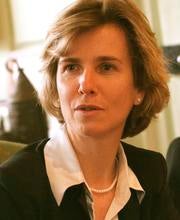
A dynamic change leader with 25 years of practice, research and teaching, Leith has taught leadership for sustainability at Harvard University for 18 years, earning numerous commendations for distinguished teaching performance.
Leith founded the Executive Education for Sustainability Leadership program at Harvard in 2014. This cross-sectoral, residential leadership program brings sustainability leadership, human well-being, purpose, biomimicry, agility, integrated business models and organizational design together.
In 2017, Leith co-founded Leaders on Purpose to engage global CEOs in defining and scaling a new leadership paradigm and business logic with the fitness to deliver on the UN Sustainable Development Goals. Global CEOs from Paypal, Siemens, Mastercard, Ikea, P&G, Sodexo, Danone, Mars, Best Buy, Phillips, SAP, BMW, L’Oreal and many more have contributed.
Leith is well known for founding Harvard’s Office for Sustainability, where over a period of 9 years she led Harvard to become a global leader in campus sustainability. In 2010, Leith became the founding executive director for the Illinois Green Economy Network, working with the state’s 40 college presidents to raise $24 million for green workforce development.
Leith has consulted with over 200 organizations and has received numerous awards internationally, including Young Australian of the Year, NSW Environment Category and a Churchill Fellowship. Leith has an environmental engineering degree (UNSW), a master of education (Harvard) and is currently completing a Master of Science in Biomimicry (ASU).
Executive Education for Sustainability Leadership
Learn powerful new strategies for making sustainability a driver of organizational engagement, innovation, and change.
Department of Environmental Health, Harvard T.H. Chan School of Public Health
Alumni Perspectives
Participants often walk away from this program talking about the unique and transformative experience they have had during the offering. But don’t take our word for it: Watch, hear, and read for yourself what your peers are saying.
Written Testimonials
Read what past participants have said about their expereince with us. We’ve organized their powerful words by sector:
“What I wasn’t expecting was just how supported I was at each step of the journey. This thoughtful program teaches you on the first day that as sustainability leaders we are all in the business of change. We are working to shift systems and practices so that they are fit for the context we find ourselves in and can meet the challenges we face as a species head-on. It is challenging, dynamic work that requires grit and resilience to execute, and to do that, we learned, we might consider creating contexts for ourselves that are sustainable and regenerative – and that this is actually part of the work. The teaching team at Harvard not only gave us tools to build our competencies in this area, but modeled this for us throughout the course and nurtured our community in a way that allowed us to draw strength from each other. I’m exiting this program feeling both equipped and nourished – what a wonderful, unexpected gift.” — Jen Singhal, former Strategic Lead, Benevity; current Principal, Jennifer Singhal Consulting, Winter/Spring 2023 Participant
“The case studies presented were remarkable. They gave us insight into how companies/initiatives have evolved over years and have turned my understanding of what I thought was possible on its head while showing that successful change requires the collaboration of many behind a common purpose… A wonderful and unexpected part of the program was the strong team spirit and deep conversations within the group. Although we had diverse backgrounds and work focus, fundamental experiences and challenges were very similar for all of us.” — Dr. Sarah Tischer, Head of Group Compliance and Responsible Business Program, Neumann Kaffee Gruppe, Winter/Spring 2023 Participant
“A big thanks to Leith Sharp who has put together this educational journey with passion and commitment, sharing a unique take on sustainability leadership with a growing alumni. Thank you for opening my eyes and sparking my intrigue.” — Simon Lange, Senior Advisor Energy Strategy, OMV, Winter Spring 2023 Participant
“Thank you to the teaching team for delivering an incredible online programme rich in content and shared learning experiences for an amazing cohort from around the globe. I highly recommend the programme for anyone interested in sustainability leadership.” — Emily Davies, Head of Corporate Affairs and Sustainability, Tower Insurance, Winter/Spring 2023 Participant
“I expected a formal extension of my skills in the sustainability space, I didn’t expect to have my thinking transformed on change management & the process of getting real change made. If you’ve thought about building your skills to effectively make the world a better place this course is worth considering!” — Paull Young, former Sustainability Strategy Manager, External Engagement, Partnerships, and Product, Meta, Fall 2021 Participant
“I participated in this program and was blown away. If you are a sustainability senior leader, you must invest in this program. Leith Sharp is a one-of-a-kind sustainability visionary. The program she and her team have developed is phenomenal!” — Elba Pareja-Gallagher, Principal, Sustainability Navigator, Fall 2021 Participant
“This program is unlike anything out there…There’s definitely a « before » and « after »…it has shifted my worldview and helped me come into my own as a sustainability leader.” — Jeanette Coombs Lanot, Sustainability Director, CHANEL, Fall 2021 Participant
“I came into this program thinking I was going to learn how to execute on a sustainability vision more effectively in my organization. I gained that and more. I was surrounded by people who are so genuinely committed to their work, so eager to share and so willing to do the hard work that lies ahead. I gained comrades for life. I learned from faculty and presenters who are not just the experts in the field but also possess a level of life wisdom and inner peace that demonstrates how sustainability work can be so fulfilling. I have returned to my work with a set of tools I immediately applied and saw measurable progress.” — Gretchen Enninga, Director of Performance Management, Optum Health, October 2019 Participant
“If you want to spend a week thinking about how to save the world with a diverse global cohort, an intellectual and experienced faculty and all-star lineup of influential speakers, at the most prestigious academic institution in the world, EESL is definitely the best place to do that.” — Edward V. Dixon, Sustainability Insights Director, Landsec, November 2018 Participant
“The focused and authentic content that was presented during the Sustainability Leadership Program was more than just thought provoking. The entire experience was masterfully crafted in a way that allowed me the opportunity to set aside my day-to-day hustle and truly be immersed in open conversations about sustainability practices and the trends and initiatives that are being developed and implemented by some of the best minds in the sustainability community.” — Erik D. Hansen, Chief Sustainability Officer, Wynn Resorts, November 2018 Participant
“This new program at Harvard in Executive Education for Sustainability Leadership is the first I’ve seen that properly addresses the organizational change demands of our work as sustainability leaders and practitioners. I served as a guest lecturer in the inaugural course, but found that I learned just as much as I contributed. I think the course is an extremely sound investment for any sustainability leader trying to work out how to get things done.” —Yalmaz Siddiqui, Senior Director, Environmental & Supplier Diversity Strategy, Office Depot, June 2014 and July 2015 Faculty and Participant
“This experience is like a controlled substance. It will blow your mind! Very enriching, validating to my intuition, clarified my thinking, elevated my energy and expanded my vision. I now perceive aspects of sustainability that hadn’t occurred to me.” — Elizabeth J Heider, Chief Sustainability Officer, Skanska USA, June 2014 Participant
“The Harvard Executive Education for Sustainability Leadership program is a pivotal opportunity to meet, share and learn about how different organizations representing a variety of sectors are confronting the challenges of making their organizations sustainable for the long term, and particularly on how to make the change that is needed to facilitate the rapid innovation required today. The program provides an important framework for thinking about, and effecting change in a rapidly changing and socially connected environment.” — Cindy Ortega, Senior Vice President, Chief Sustainability Officer, MGM Resorts International, Participating Faculty
“This program provides vital change leadership frameworks and tools to further unlock the value of sustainability at any organization. In addition, Leith Sharp’s passion for sustainability change leadership is infectious. Her determination in breaking through the barriers is evident throughout the curricula. Her real-life experiences in applying the strategies validates that conscious navigation between both operating systems is the key to success.” — Nate Shepley Streed, Director of Sustainability & Public Affairs, Chobani, November 2017 Participant
“This new program provides crucial tools, skills and information to leverage sustainability as a change agent. The thought leadership provided by the world class instructors and also my fellow participants left me motivated, committed and reenergized to the power and inspiration of sustainability leadership.” — Robert Bolin, Senior Vice President, National Director of High Performance Solutions, Syska Hennessy Group, June 2014 Participant
“Being a participant in this program allowed me the opportunity to take a step back and reevaluate my own leadership skills while opening our minds to new strategies. These strategies have since fostered a lot more innovation and collaboration within my organization at all levels.” — Christina Sprows, Former Senior Director of Architecture & Engineering, CVS Health, July 2015 Participant
“I have been able to continue the dialogue started during our week together with a number of the participants. A true sign of a great event. As I was finishing up my year end review, I have to say, the week was truly one of the highlights. Please be sure to keep up the good and impactful work!” — Ian Olson, Director of Sustainability, McDonald’s Corporation, October 2015 Faculty and Participant
“The program was transformative for me, and I realize that more and more as I find myself applying both the strategies and the tactics seemingly every day.” — Lincoln Bleveans, Executive Director, Sustainability and Energy Management, Stanford University, Fall 2021 Participant
“The course is amazing. It’s cross sector, it’s international, it’s inspirational, it has directed and self-directed learning to maximize opportunity, it challenges the notion of business as usual. This is an opportunity to be lifted away from the crises of your day job, a time to reflect and test ideas, to open up your mind to new ways of working.” – Jane Davidson, Ph.D., Pro Vice-Chancellor for External Engagement and Sustainability, University of Wales Trinity Saint David, 2016 Program Participant, 2017 Program Faculty
“This program is an amazing resource and opportunity. My fellow participants were creative and committed change makers who continue to inspire me, and the faculty opened my eyes to both thought-provoking core concepts and incredibly practical tools for moving our work forward. The ideas, tools, and connections shared by the faculty and participants are relevant for my work both in campus sustainability and as a social entrepreneur. I have been able to implement concrete strategies discussed in the sessions, and the broader conceptual framework proves useful everyday.” – Sandra Goldmark, Director of Sustainability and Environment, Barnard College, and Founder, FIXUP, 2017 Program Participant
“This program delivered a critical missing piece for me around change leadership and sustainability. As a result I left with a renewed enthusiasm and commitment that has persisted.” — Jerry Weber, Ph.D. , President, College of Lake County
“I left energized and ready to tackle the most complex adaptive problems that my college faces. Wherever your organization is in relation to sustainability this program helps you go to the next level. In addition, the creative environment and the nature of the course content takes you beyond sustainability to advance the change capability of your entire organization.” — Mary Spilde, Ph.D. , President, Lane Community College
“For over a decade in higher education I have been searching for a model of institutional sustainability that can help our senior leaders take the steering wheel. The CBI-S framework and executive education program do just that, with the right mix of process and product orientation. This is long overdue.” — Daniel Roth, Special Advisor, Campus Sustainability Office, Cornell University, June 2014 Participant
“Trusted colleagues in higher education had recommended the Harvard Executive Education in Sustainability program to me. I’m glad they did. I’ve attended many different leadership programs and workshops and have a good basis for comparison. This program was remarkable. It exceeded my expectations and gave me an actionable framework for taking an organization through accelerated change and innovation in sustainability (or any other kind of change). Engaging and learning with practitioners from across the globe and many different industry sectors was an incredible experience. The faculty were all exceptional – and what can I say about Leith Sharp? She is smart, focused, perceptive, fun, and incredibly humble about the work she’s done to shape this very organic, yet highly organized, program. This is not a program you walk away from and say, ‘that was nice’. What you learn goes with you and continuously influences your thoughts and actions in ways large and small for a very, very long time.” — Linda Lujan, Ph.D., New Ventures Officer, Chancellor’s Office, Maricopa Community College District, October 2015 Participant
“I signed up for the program to scale up our efforts at integrating sustainability into the core business of our institution. Before I came to Harvard I felt like I had come as far as I could with my current toolkit. I came back from Harvard with a powerful set of tools, language and approaches that have already begun to show their worth. Since my return from the program I have been able to make a strong and compelling case to senior leadership that sustainability is THE solution to our organizational problems. In addition to this, and quite unexpectedly, I also returned with a network of colleagues and friends that have both inspired and energized my work. The program organizers, speakers and content were impeccable. I highly recommend it.” — Candace Le Roy, Director, SFU Sustainability Office, Simon Fraser University, October 2015 Participant
“This program gave me an injection of enthusiasm, catharsis, and the ability to forge on. It provided me with a new lens about how to view my organization, accomplish my goals, and pursue my vision. I have another set of tools and language, as well as a new network of people, ranging across all sectors, to consult. I had a magical week at Harvard and highly recommend it for anyone who sees sustainability as the glue to bring people and ideas together.” — Brian Filiatraut, Director of Sustainability, Poly Prep Country Day School, November 2018 Participant
“The curation of the course materials and the organization of the cohort, alongside extremely well-coordinated class sessions, individual and team projects, and networking sessions, offer pivotal opportunities for socializing and learning critical concepts and frameworks for lifelong impactful sustainability leadership. The experience continues to pay dividends in my own career leading institution-wide sustainability issues.” — Bradley Grams, Regional Environmental Protection Specialist, Federal Aviation Administration, Fall 2021 Participant
“This Executive Education program in Sustainability Leadership is both inspiring and affirming. The program offers strong guidance and encouragement for professionals to understand what it takes to set wheels in motion to make positive changes in small and large ways. It is also an affirming and validating curriculum that allows participants time to reflect and realize actions already taken to inspire change and use those thoughts to motivate us for future action. The program is centered around sustainability and the urgent actions we all must take to change our path, but this adaptive approach to change leadership can be applied to anything.” — Jessica Wurwarg, Executive Director of Real Estate, Planning and Sustainability, Facilities Management, NYC Department of Transportation, 2019 Program Participant
“The Executive Education for Sustainability Leadership Program provides the perfect balance of high octane, academic rigor with mindful thought leadership. Led by Leith Sharp and a diverse ensemble for sustainability experts, the program is an inclusive, supportive, and contemporary experience that assembles the best and brightest students from diverse environmental backgrounds. The program promotes the right balance of pragmatism and optimism, leaving participants feeling rejuvenated and invigorated by the end. The result is a unique, academic experience and a “must do” for any sustainability executive.” –– Jason H. Giffen, Assistant Vice President, Port of San Diego, 2018 Program Participant
“The course exceeded my expectations both in the breadth and quality of the participants and in the direct applicability of the core content of the program. The focus on idea flow and managing from the middle has provided me with a new way of looking at my role within the city structure. Engagement with our residents and businesses will be more creative and productive with the tools learned in this class.” — Sally Barros, Sustainability Manager, City of San Leandro, CA, 2017 Program Participant
“As a local government leader I found this program to be relevant, engaging and visionary. I especially enjoyed the chance to interact with leaders from other sectors.” — Zaida Basora, FAIA, Assistant Director, City of Dallas Public Works Department, June 2014 Participant
“This new program provided the missing link – how to connect my commitment to sustainability with high impact leadership in a municipal environment, transcending the typical barriers of complex government structures to accelerate the integration of sustainability.” — Ruthy Bennett, Regional Energy Manager, Towns of Arlington and Bedford, MA, June 2014 Participant
“Planned or not, change is happening in our organizations and the world surrounding them. The Harvard Executive Education for Sustainability Leadership program provides participants with the tools necessary to lead this inevitable change in a networked fashion that empowers people at all levels of an organization. These leadership tools are and will be vital to leaders striving to adapt and change their organizations in a sustainable and responsible manner.” — Adam W. Chapdelaine, Town Manager, Town of Arlington, MA, July 2015 Participant
“The Harvard Executive Education for Sustainability Leadership program is an inspirational opportunity to work with every sector of business, government and non-profit organizations. This program provides an especially poignant framework for government officials as it helps the participants straddle the barriers and opportunities that exist in top down and bottom up innovations… I highly recommend this program and hope someday there will be a Part II!” — Patti Southard, Program Manager, King County GreenTools, November 2016 Participant
“I enjoyed that the learning group was diverse and the material included real examples from schools and institutions, major corporations, small businesses, and governments. This created opportunities for cross-pollination of ideas and practical tools from a broad spectrum of experience.” — Elizabeth Teague, AICP, CTP | Development Services Director, Town of Waynesville, NC, November 2016 Participant
“Attending the Executive Education for Sustainability Leadership Program has been invaluable in our pursuit of “greening” our ballparks and events. (Program Director) Leith Sharp has assembled an incredible team of industry professionals, educators, and experts to provide a roadmap of how to achieve success in sustainability at all of our respective organizations. I’d recommend this course to anyone looking to grow their environmental efforts at their company or venue.” — Paul T. Hanlon, Senior Director, Ballpark Operations and Sustainability, Major League Baseball
“The Harvard Executive Education for Sustainability Leadership program provides an excellent opportunity to learn and share best practices in Sustainability applied across range of sectors and organisations. I represent the financial sector in which ‘sustainability strategy’ is still to a large extent considered as ‘a nice to have’ and is often limited to efficient use of natural resources at offices instead of measuring and reporting information about the true source of sustainability: their social and governance performance, and how it relates to financial performance. This program educates leaders on filling the gap in terms of integrating sustainability principles within the core business strategies from which the organisation could benefit in long term. The program provides a standard tested approach to participants, which could be incorporated in day to day business. I was absolutely inspired and influenced by the program content and expertise of the faculty and fellow participants and would highly recommend it to future aspirants.” — Sachin S Vankalas, Head of Operations I Sustainability Officer, LuxFLAG, October 2015 Participant
Executive Education for Sustainability Leadership
Learn powerful new strategies for making sustainability a driver of organizational engagement, innovation, and change.
Department of Environmental Health, Harvard T.H. Chan School of Public Health
Virtual Info Session
Upcoming EESL2025 Info Sessions
- Monday, July 14. 4:30pm ET, Register via Zoom
- Tuesday, August 5, 4:30pm ET, Register via Zoom
- Wednesday, August 6, 8pm ET, Register via Zoom
Can’t attend a live session? You can still register to watch on-demand.
Past EESL2025 Info Sessions
- Tuesday, May 27, 8:00am ET, Watch on demand
- Thursday, June 5, 4:30pm ET, Watch on demand
- Monday, March 24, 4:00pm ET, Watch on demand
- Tuesday, February 4, 4:00pm ET, Watch on demand
Info sessions are intended for prospective attendees of the program or others wishing to promote attendance to senior leader in their organization or network, or for those just wanting to learn a bit more about what we do.
The organizing team will provide an overview of the course frameworks which center around organizational design and Idea Flow concepts to optimize and accelerate impact for sustainability and innovation. We will then have the opportunity to hear from several program alumni who will describe their experience and the lasting impact of the program on their approach to sustainabilty work. We will round out the session by sharing the nuts and bolts of the next course offering which runs virtually September 8 – November 24, 2025.
To learn more, contact us at SustainabilityLeadership@hsph.harvard.edu or call (617) 384-7276.
Previous webinars: for EESL2024
- Tuesday, April 2, 4:00pm ET – Watch on demand
- Monday, August 5, 4:30pm ET, Watch on demand
- Monday, July 15, 4:30pm ET – Watch on demand
- Monday, June 3, 4:30pm ET – Watch on demand
- Tuesday, May 7, 4:00pm ET – Watch on demand